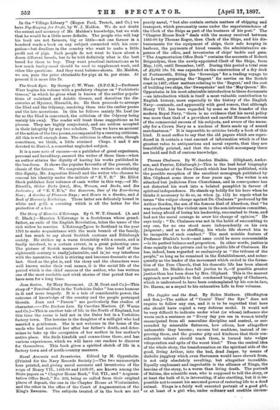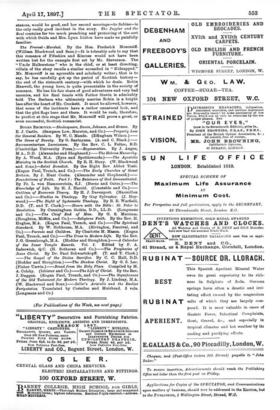The Juggler and the Soul. By Helen Mathers. (Skeffington and
Son.)—The author of " Comin' Thro' the Rye " does not require to follow any one, and it is to be regretted that here she should have copied a very dubious model. It would not be very difficult to indicate under what (or whose) influence she wrote such a sentence as " Every day you see in women totally emancipated from all masculine discipline and control, or sur- rounded by miserable flatterers, how odious, how altogether unbearable they become ; success but maddens, instead of im- proving them, and the greater pity and kindness that their con- siderable talents should teach them, is turned into vulgar vituperation and spite of the worst kind." Then the central idea of the whole story, the transformation on the spiritual side of the good, living Arthur, into the bad, dead Jasper, by means of diabolic jugglery which even Stevenson would have shrunk from, is not only absolutely revolting, but altogether incredible. Equally unpleasant and improbable is the alliance of Ninga, the heroine of the story, to a worse than living death. The portrait of Sabine, the scientific man, who is supposed to tell the story, or at least the bulk of it, is interesting, if also startling, but it is im- possible not to resent his assumed power of restoring life to a dead animal. Ninga is a fairly well executed portrait of a good girl, or at least of a girl who, under ordinary and credible circum- stances, would be good, and her second marriage—to Sabine—is the only really good incident in the story. The Juggler and the Soul contains far too much preaching and protesting of the sort with which Ouida and Mrs. Lynn Linton have made us painfully _familiar.



































 Previous page
Previous page